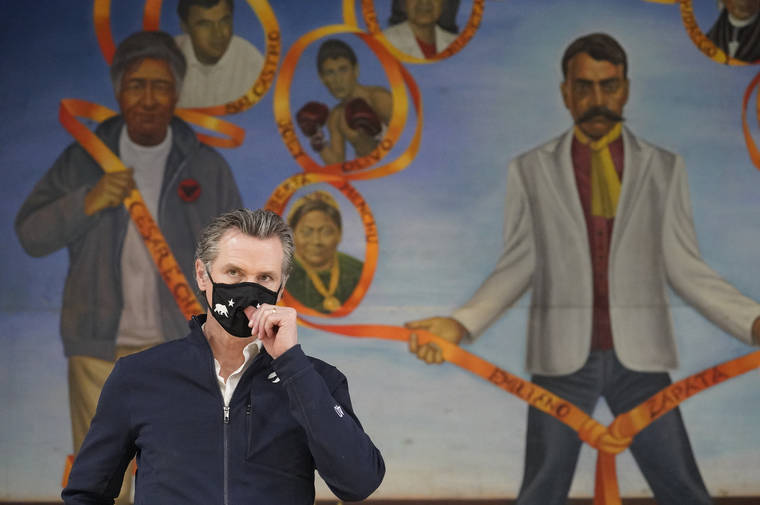BATON ROUGE, La. — States redoubled their efforts to get the coronavirus vaccine into arms Monday after last week’s winter weather closed clinics, slowed vaccine deliveries and forced tens of thousands of people to miss their shots — all while the nation drew close to recording 500,000 deaths from COVID-19.
President Joe Biden planned to mark the milestone with a moment of silence and a candle-lighting ceremony at the White House. He will also order U.S. flags lowered at federal buildings for the next five days.
In Louisiana, state health officials said doses from last week’s shipments were delivered over the weekend and were expected to continue arriving through Wednesday. New York City Mayor Bill de Blasio said last week’s supply arrived Monday. And in Nashville, Tennessee, health officials were able to vaccinate more than 2,300 senior citizens and teachers over the weekend after days of treacherous weather.
“We’ll be asking the vaccine providers to do a lot,” said Louisiana’s top public health adviser, Dr. Joe Kanter, who expects it to take a week or two to catch up on vaccinations after a storm coated roads with ice and left many areas without running water.
Snow, ice and weather-related power outages closed some vaccination sites and held up the necessary shipments across a large swath of the nation, including in the Deep South.
As a result, the seven-day rolling average of adminstered first doses fell by 20 percent between Feb. 14 and Feb. 21, according to data from the Centers for Disease Control and Prevention.
The White House said that about a third of the roughly 6 million vaccine doses delayed by bad weather were delivered over the weekend, and the adminstration planned to work with shippers and states to catch up this week. Press secretary Jen Psaki said catch-up doses will be sent to vaccination centers “as soon as they can handle them.”
The effort unfolded as some states began expanding the pool of people eligible to receive shots.
Some hospitals, clinics, community sites and pharmacies that are in Louisiana’s vaccination network will get double allocations of doses this week — just as Gov. John Bel Edwards starts offering shots to teachers, daycare workers, pregnant women and people age 55 to 64 with certain preexisting conditions.
Last week’s weather prompted local health officials in Nashville, Tennessee, to vaccinate more than 500 people with doses that otherwise would have expired, including hundreds at homeless shelters and residents of a historically Black neighborhood who were mostly seniors with underlying health conditions.
New York City officials expected to catch up on vaccinations after being forced to delay scheduling tens of thousands of appointments last week, the mayor said Monday.
“That means we’ve basically lost a full week in our vaccination efforts,” DeBlasio said. “But it will not stop us from reaching our goal of 5 million New Yorkers vaccinated by June because we still have the ability and the capacity to do it.”
Illinois’ top doctor said a plan to expand vaccines this month to people with underlying health conditions is being delayed by a shortage of doses, and it will take months for supply to meet demand. Department of Public Health Director Dr. Ngozi Ezike’s comments in a weekend Chicago Tribune opinion piece come amid complaints of shortages and difficulties in obtaining appointments.
More than 7.3 million Californians have received at least one vaccine dose, but supplies are well below the amount the state has the capacity to administer, Gov. Gavin Newsom said Monday.
California anticipates receiving 1.4 million doses this week and 1.5 million next week, Newsom said during a stop in Long Beach on a tour of vaccination efforts around the state.
Meanwhile, some states are lifting restrictions on residents, as the number of new infections eases.
In New Jersey, fans will be allowed to attend sports and entertainment events at the state’s largest facilities in limited numbers starting next week, Gov. Phil Murphy said Monday.
New Jersey venues with an indoor seating capacity of 5,000 will be able to fill 10% of seats and outdoor venues with over 5,000 seats can fill 15% starting on March 1, the Democratic governor said on sports radio station WFAN. Face coverings and social distancing will be required at events.
———
Webber reported from Fenton, Michigan. Associated Press writers Brian Hannon in Salt Lake City, Utah; John Antczak in Long Beach, California; Jonathan Mattise in Nashville, Tennessee; Sophia Tareen in Chicago; Wayne Parry in Atlantic City, New Jersey; and Zeke Miller in Washington contributed to this report.


